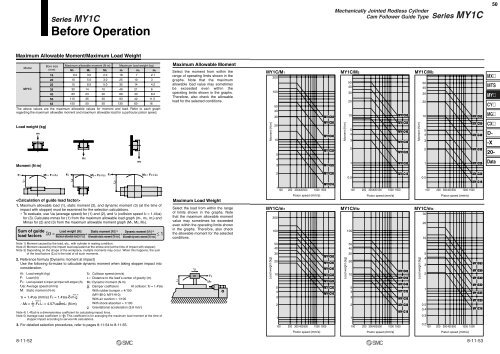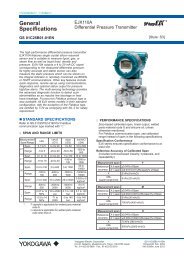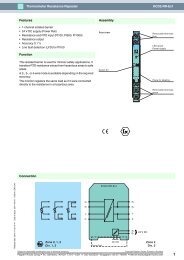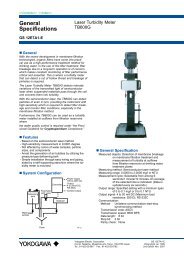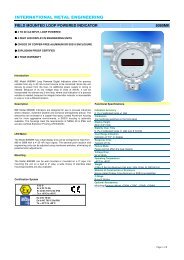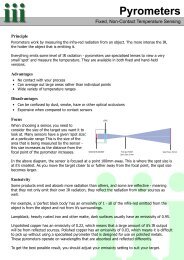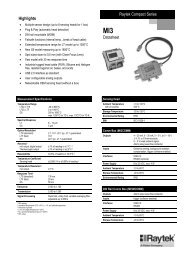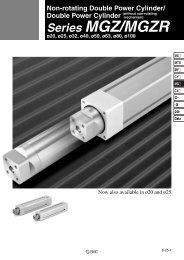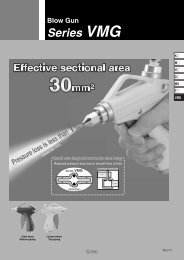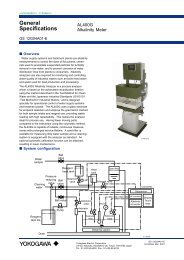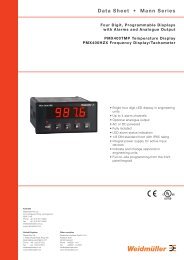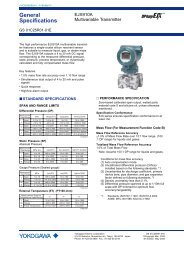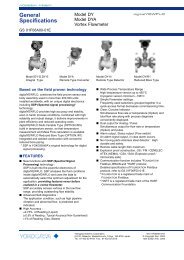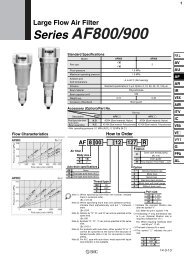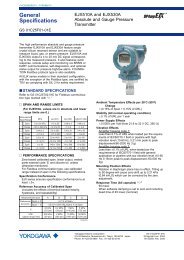MY1 Mechanically Jointed Rodless Cylinder
MY1 Mechanically Jointed Rodless Cylinder
MY1 Mechanically Jointed Rodless Cylinder
- No tags were found...
You also want an ePaper? Increase the reach of your titles
YUMPU automatically turns print PDFs into web optimized ePapers that Google loves.
Series <strong>MY1</strong>CBefore Operation<strong>Mechanically</strong> <strong>Jointed</strong> <strong>Rodless</strong> <strong>Cylinder</strong>Cam Follower Guide TypeSeries <strong>MY1</strong>C50Maximum Allowable Moment/Maximum Load WeightModel<strong>MY1</strong>CLoad weight (kg)m1Moment (N·m)Bore size(mm)16202532405063Maximum allowable moment (N·m)Maximum load weight (kg)M1 M2 M3 m1 m2 m36.0101530601151503.05.08.5142335502.03.05.01020355018253549689313071014213042602.134.268.211.516The above values are the maximum allowable values for moment and load. Refer to each graphregarding the maximum allowable moment and maximum allowable load for a particular piston speed.m2m3Maximum Allowable MomentSelect the moment from within therange of operating limits shown in thegraphs. Note that the maximumallowable load value may sometimesbe exceeded even within theoperating limits shown in the graphs.Therefore, also check the allowableload for the selected conditions.<strong>MY1</strong>C/M1Moment (N·m)2001005040302010543<strong>MY1</strong>C63<strong>MY1</strong>C50<strong>MY1</strong>C40<strong>MY1</strong>C32<strong>MY1</strong>C25<strong>MY1</strong>C/M2Moment (N·m)504030201054321<strong>MY1</strong>C63<strong>MY1</strong>C50<strong>MY1</strong>C40<strong>MY1</strong>C32<strong>MY1</strong>C25<strong>MY1</strong>C20<strong>MY1</strong>C/M3Moment (N·m)504030201054321<strong>MY1</strong>C63<strong>MY1</strong>C50<strong>MY1</strong>C40<strong>MY1</strong>C32<strong>MY1</strong>C25MXMTSMYCYMGCXD--X20-DataF1L1M1= F1 x L1F2L2M2 = F2 x L2F3L3M3 = F3 x L32<strong>MY1</strong>C20<strong>MY1</strong>C161100 200 300400500 1000 15000.5100 200 300400 500 1000 1500<strong>MY1</strong>C16<strong>MY1</strong>C200.5<strong>MY1</strong>C16100 200 300400500 1000 15001. Maximum allowable load (1), static moment (2), and dynamic moment (3) (at the time ofimpact with stopper) must be examined for the selection calculations.∗ To evaluate, use υa (average speed) for (1) and (2), and υ (collision speed υ = 1.4υa)for (3). Calculate mmax for (1) from the maximum allowable load graph (m1, m2, m3) andMmax for (2) and (3) from the maximum allowable moment graph (M1, M2, M3).Sum of guideload factorsΣα = + + ≤ 1Load weight [m]Maximum allowable load [mmax]Static moment [M] (1)Allowable static moment [Mmax]Dynamic moment [ME] (2)Allowable dynamic moment [MEmax]Maximum Load WeightSelect the load from within the rangeof limits shown in the graphs. Notethat the maximum allowable momentvalue may sometimes be exceededeven within the operating limits shownin the graphs. Therefore, also checkthe allowable moment for the selectedconditions.<strong>MY1</strong>C/m1200100Piston speed (mm/s)<strong>MY1</strong>C/m2100Piston speed (mm/s)<strong>MY1</strong>C/m3302010Piston speed (mm/s)Note 1) Moment caused by the load, etc., with cylinder in resting condition.Note 2) Moment caused by the impact load equivalent at the stroke end (at the time of impact with stopper).Note 3) Depending on the shape of the workpiece, multiple moments may occur. When this happens, the sumof the load factors (∑α) is the total of all such moments.2. Reference formula [Dynamic moment at impact]Use the following formulae to calculate dynamic moment when taking stopper impact intoconsideration.m: Load weight (kg)F: Load (N)FE: Load equivalent to impact (at impact with stopper) (N)υa: Average speed (mm/s)M: Static moment (N·m)Note 4)υ = 1.4υa (mm/s) FE = 1.4υa·δ·m·g∴ME =13Note 5)·FE·L1 = 4.57υaδmL1 (N·m)υ: Collision speed (mm/s)L1: Distance to the load , s center of gravity (m)ME: Dynamic moment (N·m)δ : Damper coefficient At collision: υ = 1.4υaWith rubber bumper = 4/100(<strong>MY1</strong>B10, <strong>MY1</strong>H10)With air cushion = 1/100With shock absorber = 1/100g: Gravitational acceleration (9.8 m/s 2 )Note 4) 1.4υaδ is a dimensionless coefficient for calculating impact force.1Note 5) Average load coefficient (= 3): This coefficient is for averaging the maximum load moment at the time ofstopper impact according to service life calculations.L1υmFEMELoad weight (kg)504030201054321<strong>MY1</strong>C63<strong>MY1</strong>C50<strong>MY1</strong>C40<strong>MY1</strong>C32<strong>MY1</strong>C25<strong>MY1</strong>C20<strong>MY1</strong>C16Load weight (kg)504030201054321<strong>MY1</strong>C63<strong>MY1</strong>C50<strong>MY1</strong>C40<strong>MY1</strong>C32<strong>MY1</strong>C25<strong>MY1</strong>C20<strong>MY1</strong>C16Load weight (kg)543210.50.40.3<strong>MY1</strong>C63<strong>MY1</strong>C50<strong>MY1</strong>C40<strong>MY1</strong>C32<strong>MY1</strong>C25<strong>MY1</strong>C20<strong>MY1</strong>C163. For detailed selection procedures, refer to pages 8-11-54 to 8-11-55.100 200 300 400500 1000 1500100200 300400500 1000 15000.2 100 200 300400 500 1000 1500Piston speed (mm/s)Piston speed (mm/s)Piston speed (mm/s)8-11-528-11-53


